This age-old recipe for preserving spicy peppers in vinegar, handed down from the past, requires only two ingredients: spicy peppers and plain, cold vinegar. These pickled hot peppers can last for years in jars and serve as a flavorful addition to soups and stews.
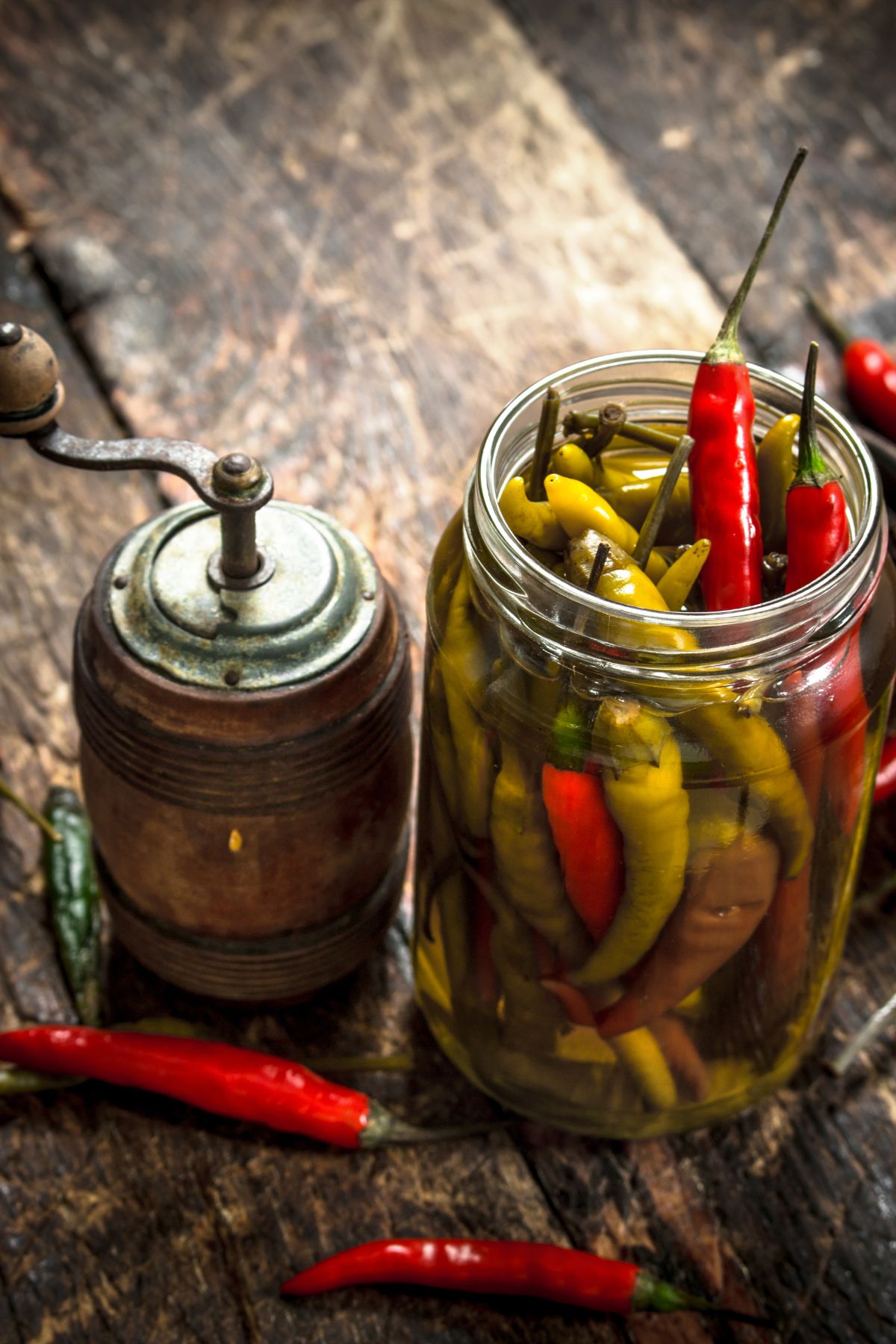
Pickling peppers is a great way to preserve peppers when you can't eat them all at once. This recipe uses a simple process of pickling that doesn't require any cooking or heating and only a few minutes to prepare.
This hot peppers recipe is part of my canning collection. If you like this recipe, you might also like this article about how to salt preserve herbs, where I show you a great technique to preserve beautiful dill or other herbs for the cold season.
Also, this Red Peppers in Mustard Sauce recipe is a great way to preserve red peppers and serve them with roasted meats in winter. And finally, let's not forget about my Pickled Cucumbers In Vinegar , this super easy recipe to use for making pickles.
Jump to:
What is Cold Vinegar Preservation?
This pickling process differs from traditional canning, which requires heating or cooking the jar under pressure and where jars make a 'pop' sound upon opening. Instead of hot water bath processing, we use cold vinegar so the jars don't seal in the same way.
Using only vinegar, it's an easy way to preserve the peppers for years without needing a vacuum seal. Just ensure your jars are clean and closed tightly before storing and your peppers will remain well-preserved, providing you with a delicious way to add heat to dishes for years, even without the 'pop'.
⭐️ NOTE: This particular recipe for preserving peppers is meant for spicy peppers that serve as condiments for winter soups and stews. It is NOT intended for bell peppers, cauliflower, carrots, beans, or cucumbers. For other uses, you might need to seek other preservation methods, as this recipe might not suit your needs.
Why You Will Love This Hot Peppers Recipe
- Easy Preparation! The jars don't require a water bath because the vinegar effectively eliminates botulism as long as you use a vinegar with at least 5% acetic acid.
- A Simple Way to Add Heat Throughout the Year. I follow this process every autumn to preserve spicy peppers. These peppers are a fantastic way to add a bit of heat to any soup or stew, like this traditional Saxon potato tarragon soup.
- Long Lasting Method. When they're stored properly, your preserved peppers can last for years on the shelf.
- Give Them Away. The vibrant and colorful jars make great holiday gifts for family and friends.
Ingredients
To make these canned hot peppers, you need only two simple ingredients. Here's a brief look at what you need.
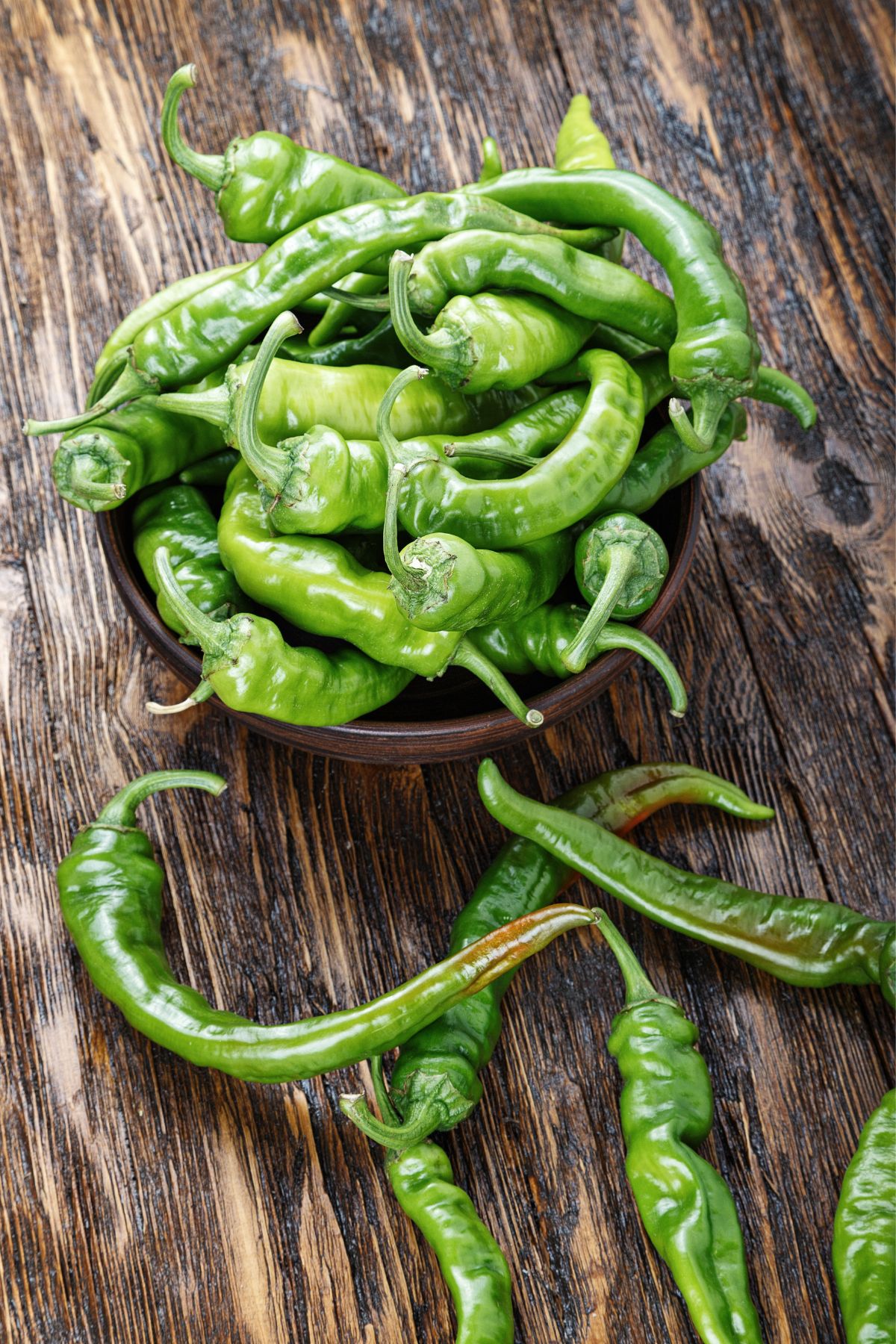
- Hot peppers: There's a wide variety of spicy peppers that work well in this hot pepper recipe! See below to pick your favorites.
- Vinegar: White wine vinegar or apple cider vinegar work great, though you can use any type of vinegar that contains at least 5% or more acidity.
- Jars: You will need to have Mason jars or the equivalent with screw top lids for this pickling recipe.
🌶️ What kinds of hot peppers are best for cold pickling?
There are many varieties of peppers suitable for making easy pickled peppers. It works well with both large and small peppers. I've listed a few:
- Jalapeno peppers
- Fresno chili peppers (not the Fresno Bell pepper)
- Serrano peppers
- Habanero peppers
- Cayenne peppers
- Thai (Bird's eye chili peppers)
- Aleppo peppers
- Shishito peppers
- Tabasco peppers
- Ghost peppers
- Hungarian Wax peppers
- Dutch Red chili peppers
- Peri-Peri peppers
- Scotch Bonnet peppers
- Banana peppers
How to Make Canned Hot Peppers
There are a few important steps that you will want to follow when using this method of canning. It's a simple recipe, but here's a look at the process.
- Clean the jars. The jars need to be sterilized before you can add the peppers. Place the jars in a large pot of boiling water for ten minutes. Once they're sterilized, remove and drain the jars one at a time.
- Wash peppers. Be sure to remove leaves and dirt from the peppers. If you notice any peppers with dark blemishes, you will want to remove them.
- Pack peppers into jars. Place the peppers in the jars, packing them in gently so that they fit tight inside. You can do this with whole or sliced peppers. I like to use whole peppers if they're small enough, while large peppers might work better sliced.
- Add the vinegar. Pour the vinegar over the peppers, covering them completely, and fill all the way up to the top of the jar. Add the lid and tighten the screw band on the jar.
- Let them sit. The peppers need to sit in vinegar for at least one month before they are ready to be consumed.
How to Store
Store your jars of hot pickled peppers in a cool pantry, cellar, or unheated basement. They need to be kept cool and not exposed to sunlight or too much warmth.
After opening a jar, they must be stored in the refrigerator. While vinegar is a great preservative, it's a good idea to throw them out once they've been sitting in the fridge for a few months.
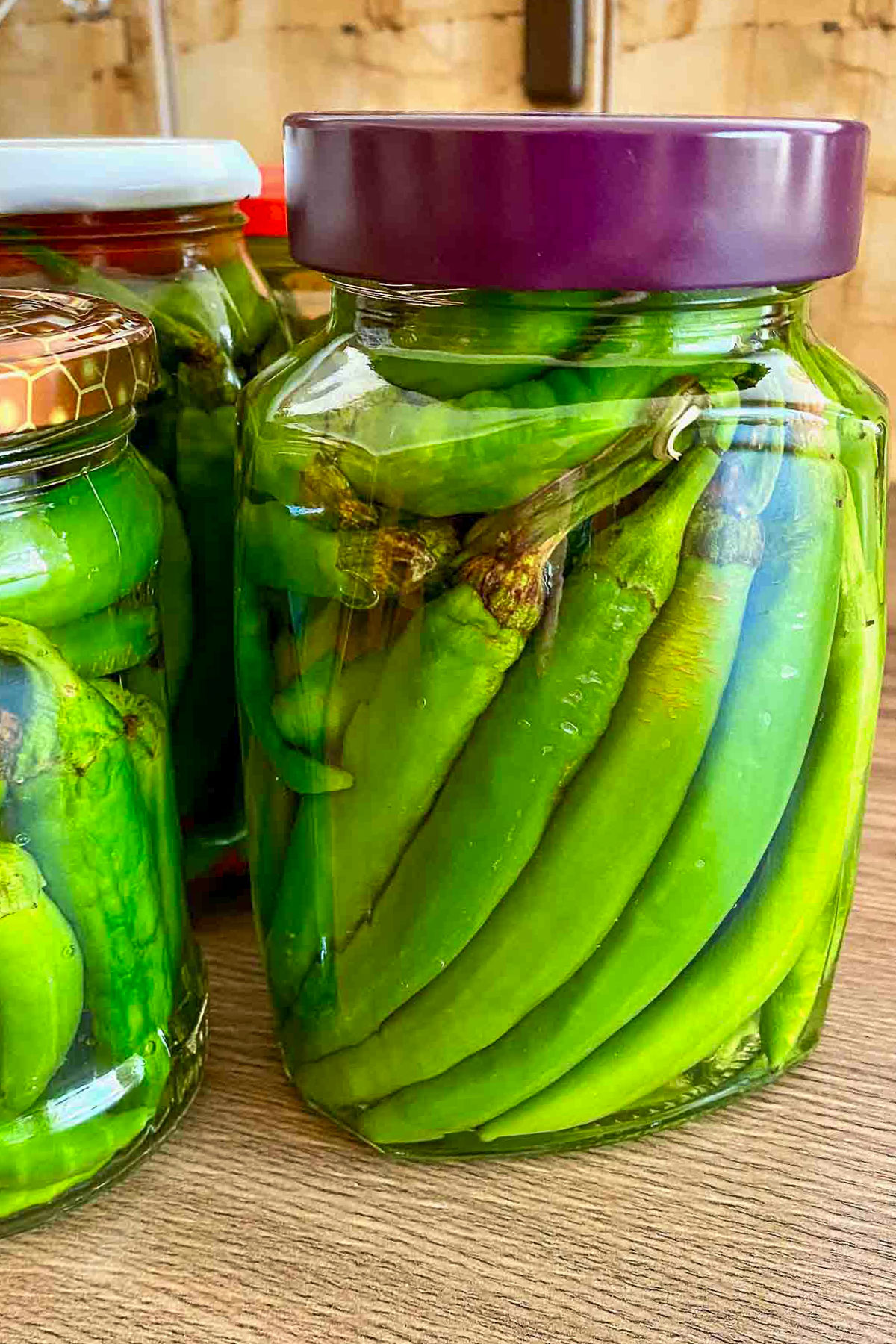
How to Serve Hot Peppers
These pickled peppers make a fantastic addition to soups and stews. Serve a jar of hot peppers next to these hearty soups and stews. They can be eaten whole and enjoyed along with the soup or sliced and added to the soup. It all depends on how spicy you prefer your food.
Soups:
- Smoky Black Bean Soup
- Beef Vegetable Soup
- Chicken Soup With Sour Cream And Garlic
- Romanian Meatballs Sour Soup
Stews:
You can even use the juice! The flavored vinegar can also be added to soups, marinades, sauces, or dressing to add a bit of spiciness.
The peppers can be sliced and added to tacos or sandwiches, as a topping to pizza, in salads, or as an extra heat for grilled meats, fish, or even eggs.
Expert Tips
Several readers inquired about the preservation process for this easy recipe.
- The jars must be clean before filling. Wash them with warm water and soap or run them through a dishwasher cycle. Sterilize them thoroughly. If you need more information about the process check here for more about the sterilization process.
- Sterilize the lids separately. Avoid placing them with the jars in the same pot. I usually clean them with warm water and soap, dry them well, and then submerge them in boiling water for at least 2 minutes.
- Use new lids. If any lids seem old or rusty, you will need to replace them. While recent guidelines no longer recommend boiling lids, I suggest submerging them in hot water for a few minutes before use for added safety. You can learn more about the new canning guidelines if you're interested.
- Cover with vinegar. The peppers and their stems should be fully covered with vinegar. Use vinegar with at least 5% acidity, and do not dilute the vinegar solution. Vinegar effectively combats botulism, so it's crucial to follow the recipe accurately.
- Cleaning the peppers. Wash the peppers and leave their stems left intact. While you can trim the stems, there's no need to remove them completely. If you decide to slice the peppers, it's a good idea to wear plastic gloves to prevent transfer of the spicy juices to your fingers.
- Do not add other ingredients. Adding extra ingredients such as herbs, spices, or other vegetables will change the recipe. It's best that you find a recipe that includes these additions.
- No boiling. This process uses cold vinegar, so note that you will not need to boil or heat the vinegar.
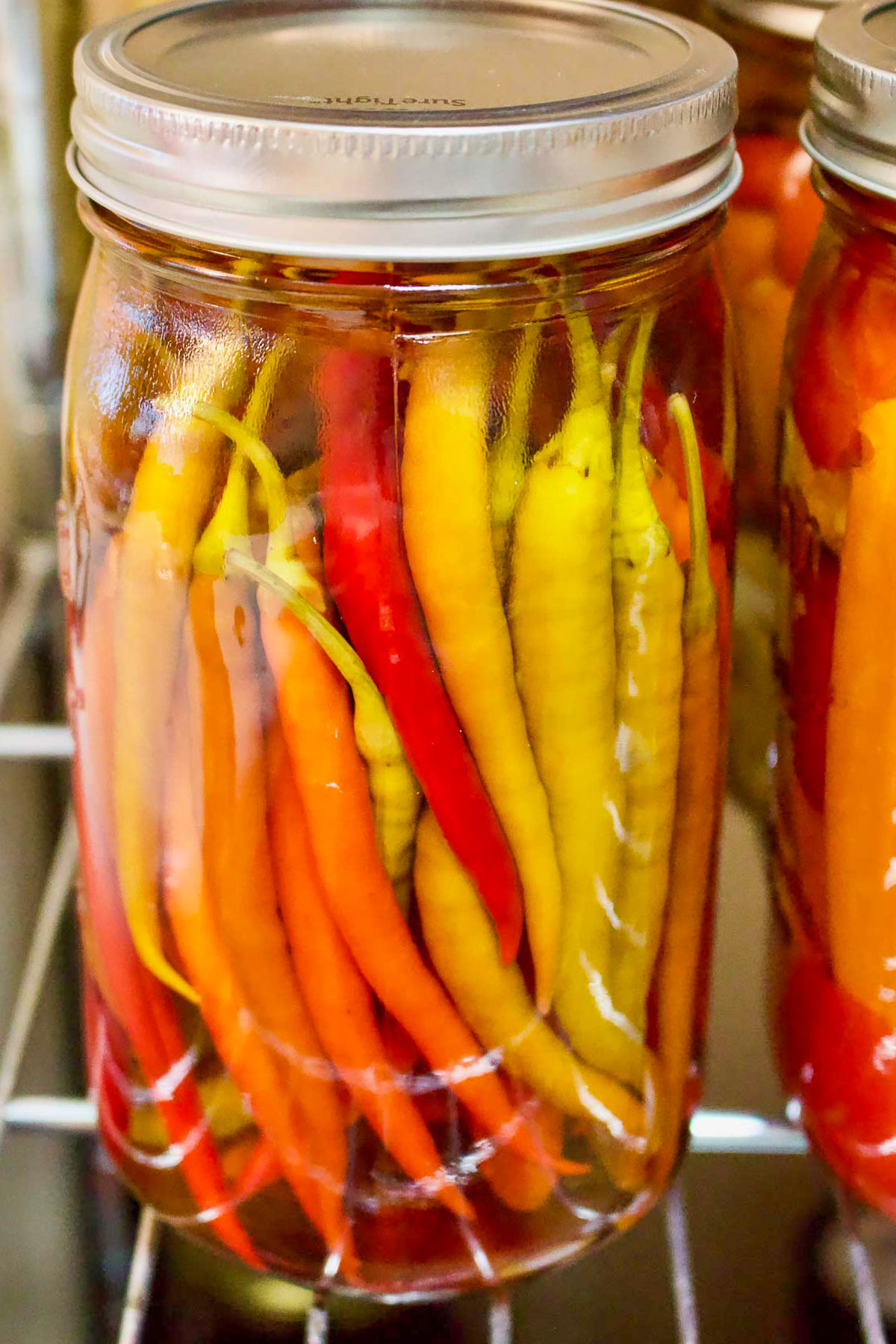
Frequently Asked Questions
Here are answers to some of the most frequently asked questions:
No, the jars do not need either process, as the vinegar prevents fermentation. The peppers can be preserved for years without any issues. Simply sterilize the jars before filling them.
No, I do not put them together with the jars. I clean them in warm water with soap and dry them well. Then, I boil some water and add the lids to sit in the hot water for two minutes.
The new guideline does not even recommend boiling the lids, but for my peace of mind, I think you should place them in hot water for at least a few minutes before you use them. Here is a link to the guidelines on boiling lids for canning if you want to read more.
Unfortunately, no, you can't do that. This is a canning method and not for quick pickles or refrigerator pickles. The results would be peppers at different stages of the pickling process. This will also create a great environment for bacteria to develop because you keep opening the sterilized jar to add more peppers.
The best solution is to use small pint jars and cut the recipe in half or a quarter to preserve a small batch of peppers. Other options to preserve peppers are to dry or freeze them.
For best results, pack the peppers into the jar either right up next to each other or, if sliced, fill the jar. Pack them tightly, but be gentle and avoid crushing them. This will keep them from floating in the jar.
Pin This For Later
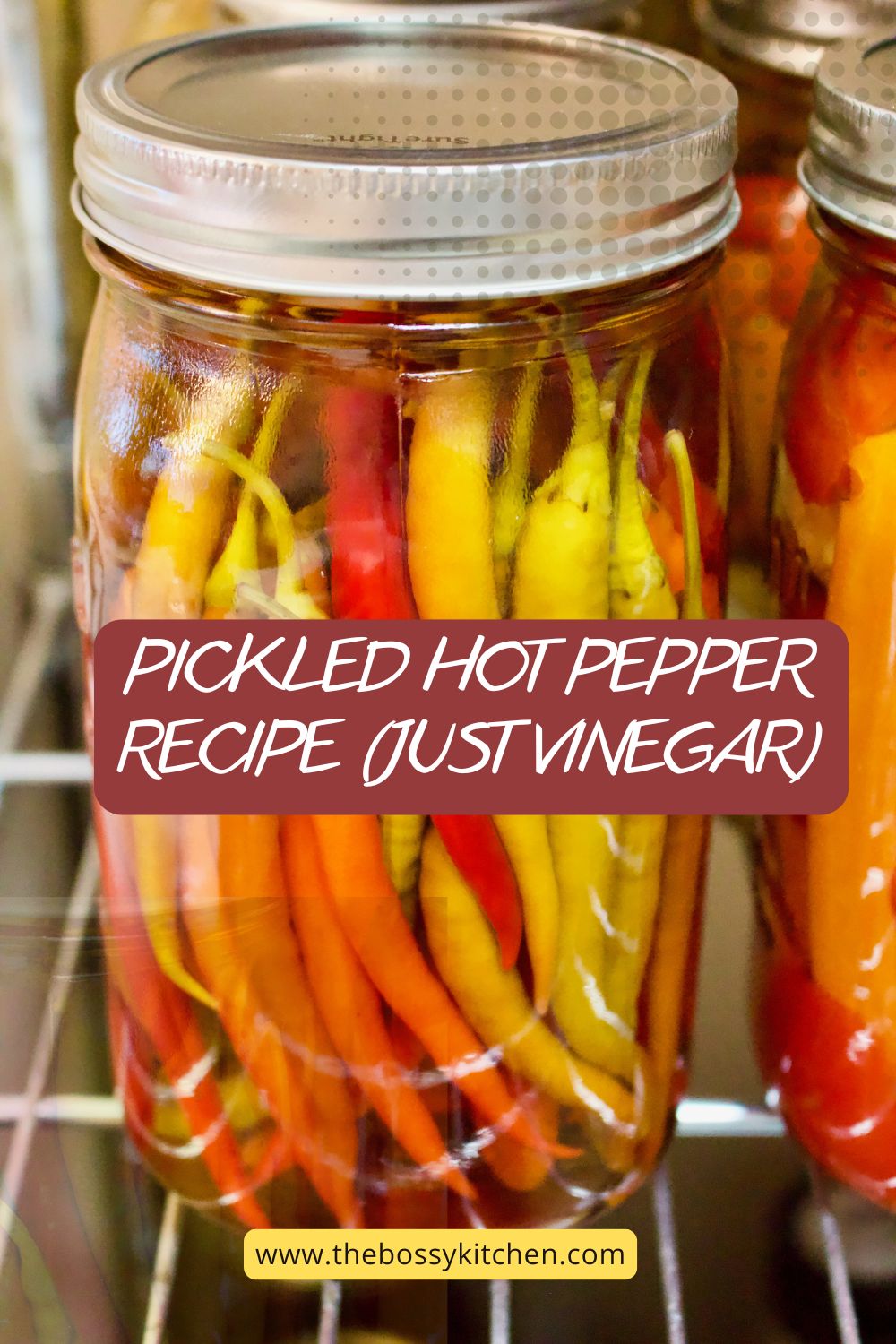
More Canning and Pickling Recipes
📖 Recipe
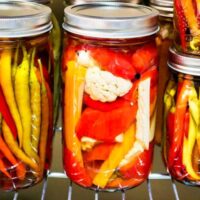
Canning Hot Peppers in Vinegar - Easy Recipe
Ingredients
- 1 pound hot peppers
- 14 ounces white wine vinegar or apple cider vinegar with at least 5% or more acidity
- sterilized jars and lids
Instructions
- Clean the jars. The jars need to be sterilized in a boiling water bath for 10 minutes in a pot of water on the stove.
- Wash and clean the hot peppers. Remove leaves, dirt and any bad peppers. Slice peppers if desired though I prefer leaving them whole.
- When the sterilizing time is up, remove and drain the hot jars one at a time.
- Place peppers in jars, packing them in and adding as many as possible until they fit tight inside.
- Pour vinegar over them to fill up the jars. Add lids, and tighten screw bands.
- The peppers need to sit in vinegar for at least one month before they are ready to be consumed.
- Great with soups or as a condiment in stews. Prepared peppers last in a cool place for years.
Video
Notes
- The jars must be clean before filling. Wash them with warm water and soap or run them through a dishwasher cycle. Sterilize them thoroughly. If you need more information about the process check here for more about the sterilization process.
- Sterilize the lids separately. Avoid placing them with the jars in the same pot. I usually clean them with warm water and soap, dry them well, and then submerge them in boiling water for at least 2 minutes.
- Use new lids. If any lids seem old or rusty you will need to replace them. While recent guidelines no longer recommend boiling lids, I suggest submerging them in hot water for a few minutes before use for added safety. You can learn more about the new canning guidelines if you're interested.
- Cover with vinegar. The peppers and their stems should be fully covered with vinegar. Use vinegar with at least 5% acidity and do not dilute the vinegar. Vinegar effectively combats botulism, so it's crucial to follow the recipe accurately.
- Cleaning the peppers. The peppers should be washed and cleaned with their stems left intact. While you can trim the stems there's no need to remove them completely. Wear gloves if you're slicing the peppers and wash hands immediately following handling them.
- Do not add other ingredients. Adding extra ingredients such as herbs, spices, or other vegetables will change the recipe. It's best that you find a recipe that includes these additions.
- No boiling. This process uses cold vinegar so note that you will not need to boil or heat the vinegar.

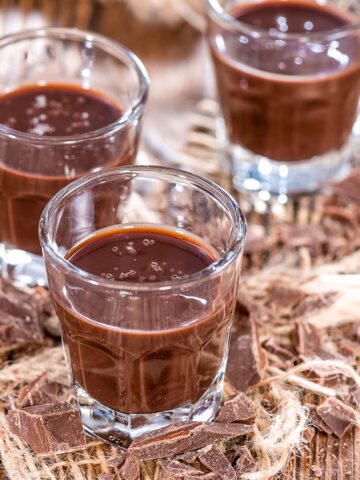
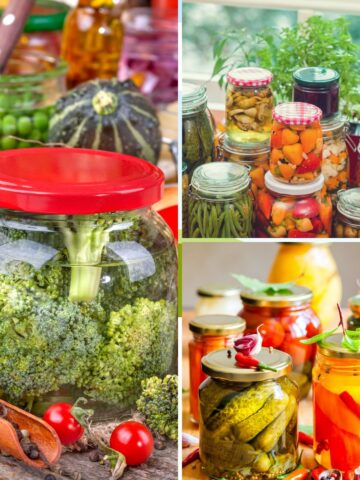
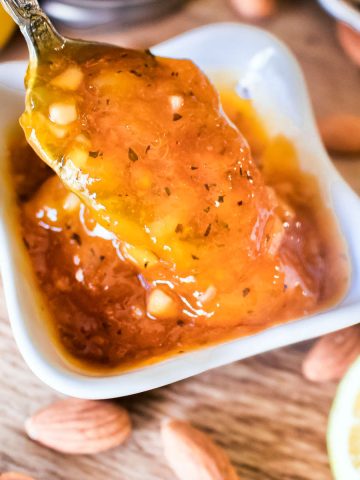
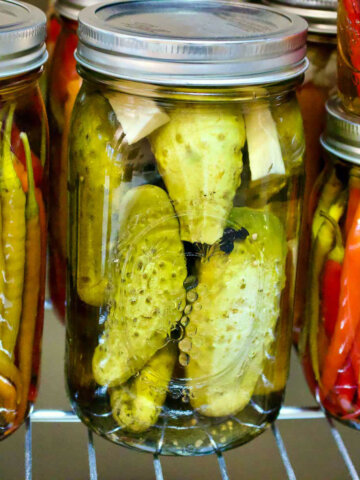
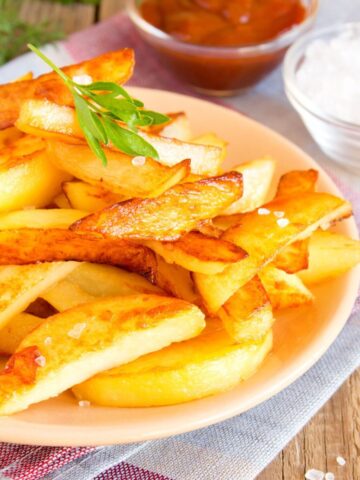
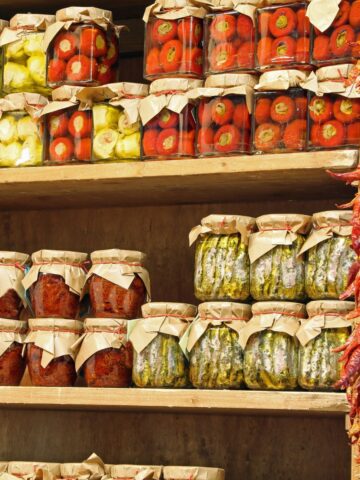
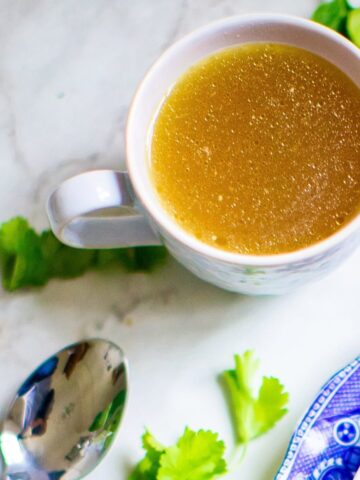
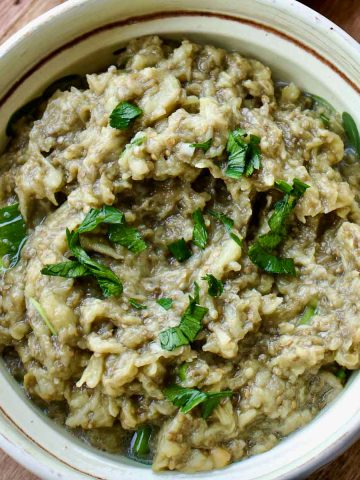
Travis says
I can do this with Carolina Reapers, ghosts, and scorpions?
Gabriela says
Yes, if you use them as a condiment.
Eric Ratinoff says
I made this recipe and have waited 30 days. When I opened the jar just now, a bunch of bubbles rushed to the surface of the liquid. Is this a danger sign, or just a natural/safe sign of fermentation? Is there a way to confirm the safety, or should I just start over?
Terrea O'Daniel says
I have a question! The peppers you show in the bowl. What kind are they? My grandmother would put these up but I never knew the same of them. We ate these with Pinto Beans. I remember the shape of them, and I really enjoyed them and would like to put some up for my husband and I. Please email me their name. Thanks a bunch.
Gabriela says
Unfortunately, I do not know the name of these peppers. I buy them at Farmers Markets, sometimes they are green, sometimes they are colored. I never saw them in grocery stores.
BobB says
Looks like they may are "Italian Long Hots" to me (aka "Cow Horns and other names.) Same with the rest of the photos. Here in Costa Rica they are called "Comillos de Elephante" or "Elephant Tusks." They range in color from green to red with yelow and orange in between. They aren't very hot but are on par with Jalapenos for heat (though heat in both can vary quite a bit.)
Italian Long Hots, Jalapenos and Aji Amarillo are my favorite 3 chili picantes. I buy them all at our local farmers market (and also grow my own.) I have not seen Italian Long Hots offered in supermarkets here however. Anyhow, I hope you find a source for them ...they are a nice chili pepper!
BobB
Debbie B. says
Can you mix different types of pepper in the same jar?
Gabriela says
I never tried it, but I don't see why not.